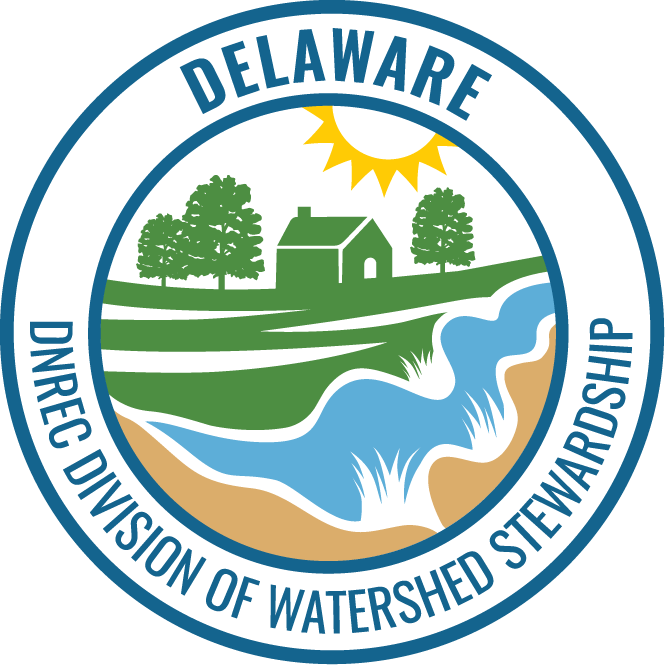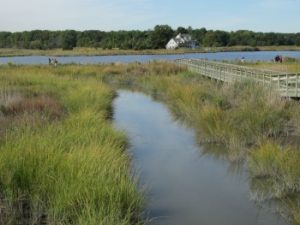
Facebook Twitter Instagram YouTube
Written on: December 9th, 2016 in Education and Outreach
By Mary Rivera and Debra Forest, DNREC’s Division of Fish and Wildlife Aquatic Resources Education Center

The quiet of a peaceful morning in the Woodland Beach saltmarsh is interrupted by a flock of 60 lively fifth grade students. Squeals of delight emanate from several of the children at the fish station where they get a close-up look at native fish. Many of the students have never touched or held a fish before. Their nervous giggles are replaced by wide grins when they hold a mummichog or bluegill and learn about fish characteristics and adaptations.
At the macroinvertebrate station, several budding fifth grade scientists dip net in a freshwater pond, collecting specimens to identify and study. On the boardwalk, a group of students conduct water quality tests on a bucket of brackish water. The kids take turns measuring DO, salinity and pH, using an array of testing equipment. Another group moves along the boardwalk on a scavenger hunt for typical plants that grow in this unique ecosystem. Ten more students sit on benches in one corner of the boardwalk, listening intently to the natural sounds of the marsh.
The Eco-Explorers Program is designed to complement the science curriculum for fifth grade classes in Delaware. Participating teachers receive training and materials they will use in the classroom to introduce their students to the topic of wetlands. After completing the classroom segment of the program, teachers bring their classes to the Aquatic Resources Education Center near Smyrna to spend a day outdoors being “scientists”.
Parent volunteers accompany the school groups to chaperone the students and help them as they explore the saltmarsh. Often the parents are as thrilled and engaged as their children as they discover this wonderful and valuable locale.
Students have the opportunity to investigate six different eco-stations in the marsh where they learn about fish, macroinvertebrates, plants, and water quality. They also learn to observe and interpret signs of animals that live in the salt marsh. They explore the ARE’s boardwalk and ponds to discover the relationship of the marsh to Delaware Bay. The guided field work reinforces classroom learning and allows the students to observe first-hand the living and non-living components of the saltmarsh ecosystem.
Eco-Explorers activities are hands on and students are encouraged to try tasks that real scientists would perform when studying an ecosystem. Activities are led by a talented and knowledgeable staff of seasonal employees and volunteers. Field trips are offered every spring and fall and available dates fill up quickly with teachers eager to explore the marsh with their students.
Over the years, tens of thousands of students, parent chaperones and teachers have had the opportunity to participate in the Eco-Explorers Program and take away a deepening respect for the value and importance of Delaware’s wetlands.
The boardwalk at the Aquatic Resources Education Center is open to the public whenever there are no scheduled programs. Visitors to the Center will find this hidden gem situated along Route 9 near Smyrna. They can stroll along the boardwalk, enjoying beautiful marsh vistas and glimpses of the abundant birds and wildlife that inhabit the marsh. Two stocked, catch and release fishing ponds are also available for public use.
A new Aquatic Resources Education Center is scheduled to open very soon in partnership with Delaware’s Bayshore initiative. The new facility will provide additional indoor and outdoor interpretive areas plus new hiking trails.
For more information about the Eco-Explorers Program and the Aquatic Resources Education Center, go to de.gov/arec.